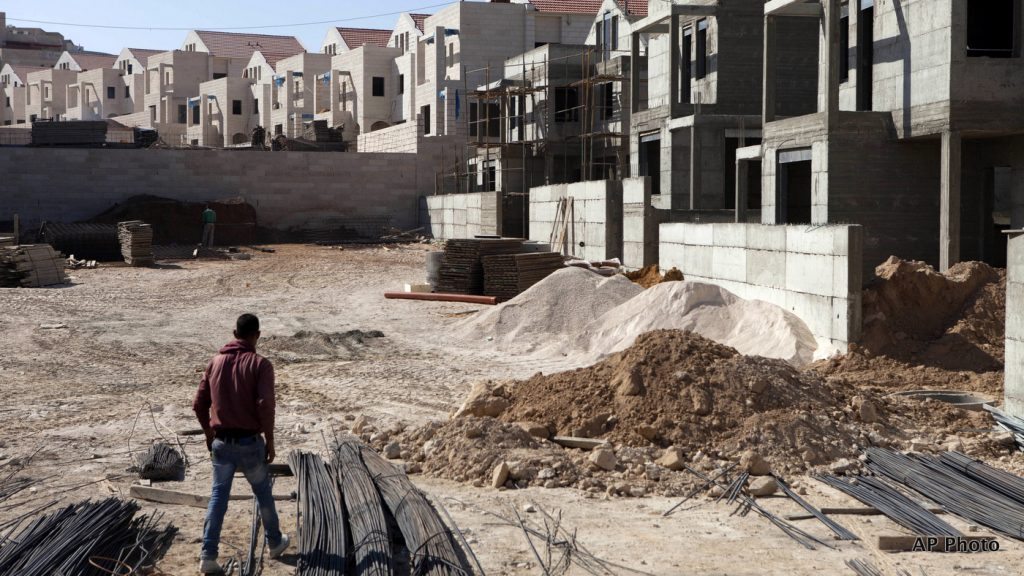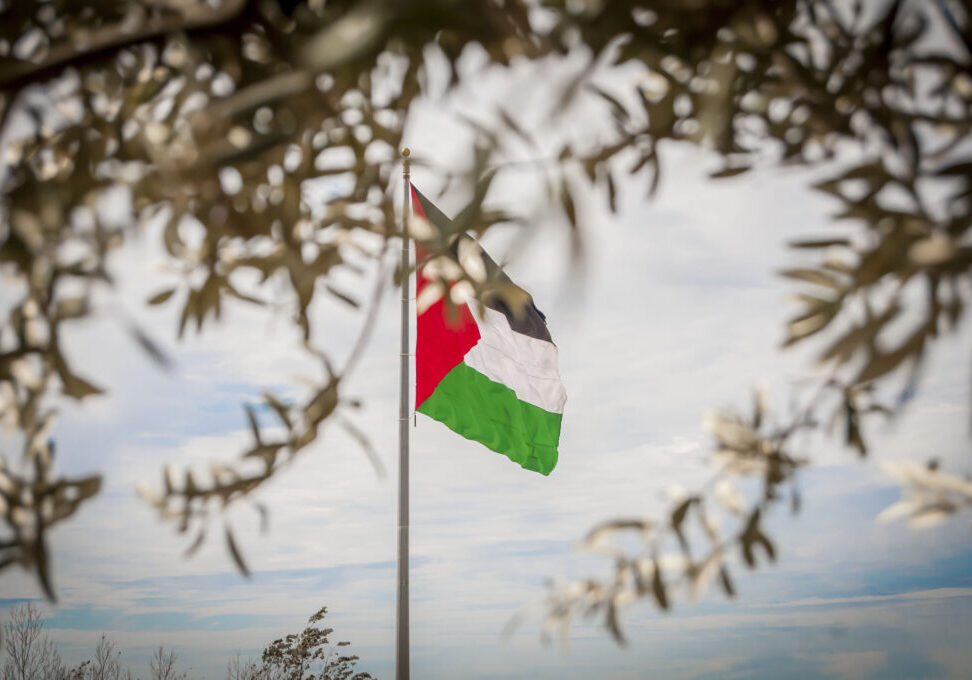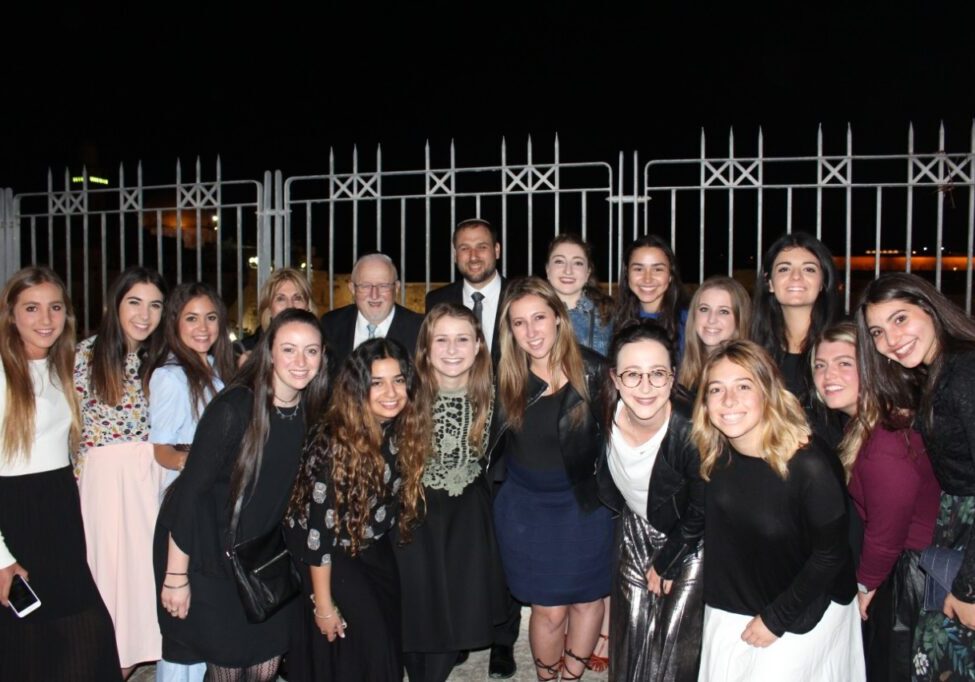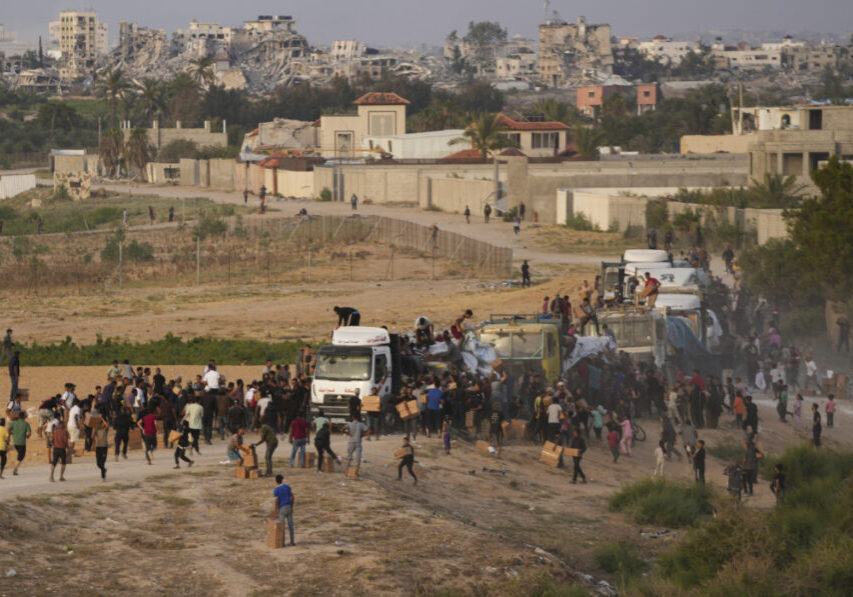Australia/Israel Review
Noted and Quoted – March 2019
Mar 6, 2019 | AIJAC staff

Fanciful figures
A highly misleading Associated Press (AP) sourced article touted claims by the Israeli anti-settlement NGO Peace Now that inaccurately presented a substantial decrease in settlement housing construction as a substantial increase.
In the story, AP bureau chief for Israel and the Palestinian territories Josef Federman wrote: “The data compiled by Peace Now showed a drop in construction starts during Mr Trump’s first year in office, to 1643 units in 2017, from 3066 units the previous year. This drop appears to reflect the lingering effect of reduced planning during the final two years of the Obama administration. But the data for the first nine months of last year [2018] indicate the beginning of a Trump effect, with construction starts 20 per cent higher than the same period a year earlier.”
Federman’s claim is simply wrong. Official statistics show settlement housing starts over the period he cited were actually down almost as much as he claimed they were up. As the Jerusalem Post’s Tovah Lazaroff reported on Dec. 19: “Overall settler housing starts from January to September of this year [2018] were down by 17%, from 1,459 to 1,206, when compared to the first nine months of 2017,” The Australian (Jan. 4).
A Revolutionary proposal
Reflecting on the 40th anniversary of the Iranian revolution and who should succeed the current Supreme Leader Ayatollah Khamenei, Lowy Institute analyst Rodger Shanahan nominated a number of foreign policy decisions he would like Teheran to adopt in what appeared to be a plea for the Iranian regime to assume greater regional leadership.
According to Shanahan, “the times call for a rational strategic actor who can exploit the weaknesses in its opponents, not ideologically driven tacticians who risk strategic defeat to achieve tactical outcomes. And the greater the hardliners’ influence on policy in Teheran, the more difficult will it be for the third supreme leader to achieve strategic coherence, let alone international acceptance.”
Contrary to Shanahan’s implication, there is no evidence suggesting that the regime – and the Islamic Revolutionary Guards Corps which maintains broad and deep control over almost every sector of the country – would even consider loosening its ideological commitment to radical Islamism at home and abroad. To do so would severely undermine the very legitimacy of the Islamic regime, Australian (Feb. 2).
Ayatollah’d you so
Elsewhere, American columnist Bret Stephens said, “From its beginning… the Islamic Republic of Iran has enjoyed the generous benefit of the doubt from credulous observers in the West. History hasn’t been kind to their sympathy.”
Stephens noted the rollcall of Iranian leaders promoted by some in the West as potential harbingers of a new direction for Iran, but which in each case turned out to be a “false dawn”. This included 1990s Iranian president Mohammad Khatami who was “supposed to be a moderate,” but “that didn’t stop the bloody crackdown on student protests in 1999 or Iran’s illicit pursuit of a nuclear weapons program during his tenure” and current President Hassan Rouhani whose “government executed close to 1000 people [in 2015], roughly double the figure of 2010.”
The piece extensively discussed Iran’s aggressive foreign policy, its contempt for the West and determination to develop nuclear weapons technology, Australian Financial Review (Feb. 16).
History Rebuff
The Israeli Government’s decision to end the Temporary International Presence in Hebron (TIPH) after 22 years was covered by SBS TV “World News” (Jan. 30).
SBS newsreader Janice Petersen said “international observers reporting on human rights violations in the West Bank city of Hebron have been ordered out by the Israeli Prime Minister.”
TIPH was set up to monitor compliance with the agreement that split Hebron into Jewish and Arab sectors as part of the Oslo Accords. Its role is not to “report…on human rights violations”.
Reporter Helen Isbister said TIPH was “set up in the aftermath of a massacre by an American-Israeli settler at the Ibrahimi Mosque in which 29 Palestinians were killed” and noted the “city’s religious significance” for Jews.
In fact, the Ibrahimi Mosque is also known as the Tomb of the Patriarchs which Jews have honoured since 1000 BCE as the burial site of Judaism’s founders – Abraham, Isaac, Jacob, Sarah, Rebecca and Leah. The structure was built by King Herod in 31 BCE and only became a mosque in the 7th century.
Although this history was missing from the report, Isbister did explain how Hebron “was deserted by Jews after a massacre in 1929 in which 67 people were killed.”
SBS viewers would have benefited from knowing that Israel lost faith in the TIPH after a series of recent incidents captured on video, including TIPH observers slashing the tyres of Jewish residents and a Swiss TIPH member slapping a 10-year-old Jewish boy in the face.
Uncultured claims
ABC Middle East correspondent Eric Tlozek’s report on Israel’s recent departure from the United Nations Educational, Scientific and Cultural Organisation (UNESCO) leaned heavily on dubious claims from the Palestinian Authority.
Focusing on the West Bank village of Battir, Tlozek said it was “one of three Palestinian sites inscribed on the UNESCO World Heritage list. An ancient place of terraced fields and aqueducts.”
Tlozek said, “Israeli settlements, which are illegal under international law, overlook the World Heritage site and a wall built by Israel almost entirely cuts it off from nearby Bethlehem…The Palestinian Authority says World Heritage protection is the only thing slowing down the expansion of settlements and the construction of another wall across the site.”
Actually, the “wall” Israel wanted to build in the area would have run on the Green Line in sovereign Israeli territory.
The report also did not explain that after the 1948 war, 30% of Battir was on the Israeli side, but Israel agreed to let Palestinian villagers continue accessing their lands there. Nor did the story say the proposed wall had already been blocked after a petition to Israel’s Supreme Court and a commitment by the Israeli Defence Force the wall was not going to run through the village. In other words, the UNESCO listing was political.
Moreover, Israel’s objection to UNESCO is not merely that it listed “Hebron as a Palestinian heritage site, and resolutions criticising Israeli activity in the old city of Jerusalem” as Tlozek said. Rather it is the politicisation of UNESCO which endorses provocative resolutions that describe holy sites in exclusively Islamic and Arabic terms, to the exclusion of Jewish and Christian rights and perspectives.
Palestinian Authority spokesperson Ahmad Rjoob was quoted saying the UNESCO listing blocked an Israeli plan to build “more than 14,000 units, you know, in that area.”
Rjoob’s claim appears to be based on a private initiative first proposed in the early 2000s to build a new neighbourhood called Givat Yael in an area of the West Bank near the Green Line. Not only has this project never been approved, Battir is nowhere near it, so the UNESCO listing had nothing to do with it not going ahead, ABC TV “7pm News” (Feb. 9).
Reporting lies with impunity
A noxious Guardian Australia editorial (Jan. 24) abandoned all pretence to balance, facts and context to bash Israel.
The paper claimed that of the Palestinians killed during protests along the Gaza-Israel border “most… were unarmed and posed no danger to anyone, with little more than rocks in their hands and slogans on their lips.” It said Israel killed protesters using “immoral and unlawful” methods to “shoot, gas, shell and kill protesters”.
The reality is that most of the dead were claimed by Hamas and affiliated Islamist terror organisations as their members.
The paper dismissed Israel’s claim the protesters intended violence, saying “if one can kill with impunity, then can one lie without consequence?”
The Guardian apparently was not subscribed to Hamas’ social media accounts that ordered able-bodied Palestinians to carry weapons and try to cross the border to kill and kidnap Israelis.
The editorial tried to smear Israel’s creation by misrepresenting Israeli historian Benny Morris’ nuanced account of the events of 1948, claiming he “lifted the veil on the ethnic cleansings on which Israel was founded.”
What Morris has actually said, as for instance in a recent Haaretz article (Jan. 21), is that while there were expulsions of Arab residents in some areas, “the majority fled or were made to flee” and what happened was “not exactly ‘ethnic cleansing’.” Furthermore, Morris wrote, the only alternative to this for the Jewish community of Palestine in 1948 was that “the Arabs would commit genocide against them.”
The Guardian website subsequently amended the claim that Israel shelled and used gas to kill Palestinian protestors.
Exploitation expert
Fringe writer CJ Werleman seemed to suggest US President Donald Trump’s condemnation of antisemitism in his Feb. 5 State of the Union address was disingenuous and an exploitation of Jews.
Werleman said “To inculcate himself against charges of stoking racism and xenophobia, Trump shamelessly used Jewish Americans as a stage prop … using Holocaust survivors, including one who survived the Pittsburgh synagogue shooting, to demonstrate his appreciation of immigrants and religious minorities,” Sydney Morning Herald (Feb. 11).
But the Australian’s “Cut&Paste” (Feb. 9) accused Werleman of double standards, saying he used “Pittsburgh Jews as a prop” in an Oct. 29, 2018 tweet that said “Hamas condemns deadly shooting attack on Pittsburgh synagogue, wishes ‘speedy recovery’ of wounded, ‘all sympathy with families of victims’ … A reminder Hamas is not driven by hatred of the Jewish people, but rather by resistance to European colonial rule and occupation.” The paper quoted Hamas’ Charter which explicitly calls for killing Jews wherever Muslims find them.
Other Werleman statements exposed included his Tweet on Jan. 31 that “Israeli Occupation Forces shot dead this 16-year-old Palestinian girl in Jerusalem today. After killing her, they discovered only school textbooks and Islamic scripture in her bag.”
The girl was, in fact, brandishing a knife, as even photos Werleman linked to in his tweet showed.
Duffill kerfuffle
Academic Paul Duffill, a vocal and long-standing advocate of the Boycott, Divestment and Sanctions movement (BDS) which effectively argues for Israel’s elimination, concealed this important background in an opinion piece that appeared to be merely about policies to encourage Israeli-Palestinian peace.
According to Duffill, there is no peace between Israel and the Palestinians because “an imbalance of power” between the two sides “is a critical block to achieving peace through negotiations”.
He attacked the Morrison Government’s recognition of west Jerusalem as Israel’s capital and praised the ALP party resolution that a future Labor Government should unilaterally recognise a Palestinian state.
Recognition, he claimed would “begin…to reduce the hazardous power imbalance” between Israel and the Palestinians and “will also add pressure on Israel to end human rights abuses and commit to genuine negotiations to secure peace for Israelis and Palestinians. This would also likely bolster Israel’s own regional security and the struggle against extremists.”
Peace would undoubtedly “bolster” Israel’s security but linking the Israeli-Palestinian conflict to the struggle against extremists is vacuous. Israel is rarely featured in Islamist propaganda over conflicts in Yemen, Syria, Iraq and Iran, which are the main destabilising factors affecting the Middle East.
Buried in the text was Duffill’s real agenda. “Recognition of Palestine does not lock the parties into pursuing only the elusive ‘two-state solution’ should it prove untenable and better solutions arise from genuine negotiations between the parties,” he said.
Better solutions? In other words, solutions that do not allow Israel’s continued existence as a Jewish homeland.
Moreover, how does unilateral recognition bring a Palestinian state any closer if the Palestinian leadership refuses to accept repeated offers of a state and today even rejects negotiations? Sydney Morning Herald (Feb. 11).
Clichés and Reality
In a published response in the SMH (Feb. 14) AIJAC’s Ahron Shapiro dismissed Duffill’s approach as reliant on “unhelpful clichés.”
He noted that “west Jerusalem has been Israel’s capital since 1949 and is not occupied territory – [PM] Morrison’s announcement was no free kick for Israel. Rather, for the first time and in a measured way, Australia gave an explicit endorsement to the establishment of a Palestinian state with its capital in east Jerusalem should the Palestinians agree to peace with Israel. This represented a clear incentive for Palestinian leaders to return to negotiations with Israel with the assurance that Palestinian national aspirations would have the backing of Australia – provided, naturally, they agree to live alongside Israel in peace.”
Shapiro argued that the absence of peace and a Palestinian state is not down to a power imbalance but “a reflection of the reality that the Palestinians rejected the UN partition plan of November 29, 1947, establishing two states, in favour of open-ended war.”
Unilateral recognition, he said, would reward the Palestinian leadership for “continuing to say ‘no’”.
ABC gets it right on the left
The ABC is often accused of ignoring left-wing antisemitism, so it was surprising to hear Matt Bevan on Radio National “Breakfast” (Feb. 12) discuss the controversy over US Democrat Congresswoman Ilhan Omar, who is pro-BDS and is accused of making antisemitic statements.
Bevan started off with two wobbles. He wrongly claimed that BDS “aims to apply economic pressure on Israel to change its policies towards its Arab population”.
And when referring to Omar’s 2012 Tweet, “Israel has hypnotized the world, may Allah awaken the people and help them see the evil doings of Israel” he cut out the middle bit.
So, listeners heard him say, “Congresswoman Omar said in a tweet in 2012 that Israel has hypnotised the world and referred to the evil doings of Israel.”
But Bevan then noted Omar had tweeted that US politicians expressing concern for Israel is “all about the Benjamins, baby” which, he explained, means money, and which she accuses “the Israel lobby” of using to “buy… support from Congress people for the politics of the Israeli government.”
He noted that the Democratic Party leadership, including House Speaker Nancy Pelosi, have condemned Omar.
Bevan read extensive sections from the statement which defended the right of Americans to criticise Israel but said “‘Congresswoman Omar’s use of antisemitic tropes and prejudicial accusations about Israel’s supporters is deeply offensive…We call upon Congresswoman Omar to immediately apologise for these hurtful comments.”
He said “so, the Democratic leadership has turned on Congresswoman Omar, Fran, and it’s up to her now to respond to this. But when the leadership of your party condemns you for using antisemitic tropes, the apology has to be pretty powerful.”
And Again
On Feb. 19, Matt Bevan discussed with Fran Kelly on Radio National “Breakfast” the defection of seven British Labour MPs in protest over Jeremy Corbyn’s leadership of a party which stands accused of tolerating antisemitism.
Bevan said “we’ve discussed Fran, before, the accusations of antisemitism within the Labour party. Comes from a mixture of comments which are obviously antisemitic from some Labour figures.”
Seeing red over Greens
Columnist Janet Albrechtsen accused too many in the Australian Greens party of tolerating antisemitism and having a policy of deliberately refusing to “engage” with the Australian Jewish community.
Albrechtsen cited regular “non-political” Shabbat dinners Jewish leaders host “for different community groups” – Young Labor, unionists, Chinese community leaders – “where people meet, eat and talk to other people from different walks of life…Yet still the Greens have, for years, refused to be part of these dinners.”
“If the Liberal Party of Australia refused point blank to engage with credible Muslim groups, we would banish its members as bigots. If the ALP continually rebuffed efforts to engage with Christian groups, we would out its members as bigots,” she said.
She added, “We can disagree over Israeli politics and policies, the future of the Middle East peace process, settlements, refugees and much more. We can condemn the actions of Israeli Prime Minister Benjamin Netanyahu too. It’s a free country… But when a political party treats the members of a religious group as personae non-gratae, refusing to meet them or speak with them, that is bigotry,” Australian, (Feb. 13).
Tags: Australia, Media/ Academia






